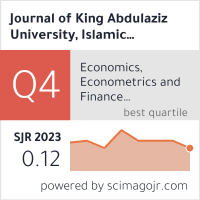Unveiling the Intricacies of Shariah Governance in Islamic Financial Institutions: A Hybrid Approach
Abstract
The study aims to explore Shariah governance literature by deploying a hybrid approach that fuses structured literature review with bibliometric analysis. The hybrid approach highlights emerging trends, influential aspects, most occurring keywords, intellectual clusters, emerging themes, and avenues for future research. Existing literature features limited coverage and overlooks some essential dimensions of Shariah governance. We bridge these gaps through two contributions: (1) we underscore previously overlooked, yet important themes like Shariah audit, compliance, and reporting; and (2) we do not impose any restrictions for time or region in our sample. Additionally, we also expand the coverage of literature by considering studies from Web of Science (WoS) core collection in the review, a source mostly ignored in review studies covering Shariah governance. The analysis shows that literature prefers the quantitative approach over qualitative one. The essential dimensions like Shariah audit, compliance, and reporting are marginally covered in the Shariah governance research. Further, the dominant themes include examining the impact of various aspects of governance on performance and risk management of firms, and comparison of the governance practices of Islamic and conventional institutions.
First Page
77
Last Page
90
Recommended Citation
Siddiqui, Ozair and Afzal, Muhammad Suleman
(2025)
"Unveiling the Intricacies of Shariah Governance in Islamic Financial Institutions: A Hybrid Approach,"
Journal of King Abdulaziz University: Islamic Economics: Vol. 38:
Iss.
2
DOI: https://doi.org/10.64064/1658-4244.1004
Creative Commons License

This work is licensed under a Creative Commons Attribution 4.0 International License.



